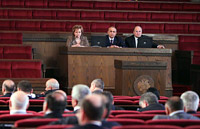Yesterday after noon it was expected that the National Assembly would discuss the law on TV and Radio submitted by the government.
For this purpose the deputy-minister of economy Mushegh Tumasyan, members of the state committee on coordination of the digitization process of TV channels, authors of the bill Avetis Berberyan and Karen Andreasyan were called to the National Assembly. However, after noon these officials disappeared and the chair of the NA Hovik Abrahamyan stated that another draft is being discussed. It became clear that during the break the members of the Heritage faction complained to Abrahamyan that the ones, who submitted this bill, didn’t read the recommendations of the Heritage. The head of the Heritage faction Stepan Safaryan informed that they had submitted a 30-page recommendation kit to the government on Monday but Tumasyan informed that they didn’t have the time to read that. “Mr. Abrahamyan organized a joint discussion with the representative of the government and ensured that this discussion takes place between us and the government representatives. The chair of the NA realizes that if the NA starts to work in this manner with the government than he will have issues with the rest of the NA MPs because in this case the rights of the whole faction are being violated. If we don’t know the opinion of the government to these recommendations then we won’t be able to participate in the discussion of this draft. We have said that we are not gong to tolerate if the bill is discussed without our recommendations,” says Safaryan. The latter also informed that they had suggested restricting some of the formulations of the draft. In the words of the MP a lot depends on definitions and if those are not clear then those can cause numerous slips and omissions. “For example they are saying let the sponsor support the TV outlet or show and the show would advertise and praise the products of the sponsor. According to European criteria such a thing doesn’t exist. The sponsor supports and at the end and beginning of the show they mention who the sponsor is and information is provided about his/her main activities. During the sponsored programs it is forbidden to provide a specific commercial for the product of the sponsor. It is unprecedented. There are other limitations, which are very important for the future control of the law on part of the TV commission,” says Safaryan. The proposed amendments are meant to regulate Armenia’s ongoing transition to mandatory digital broadcasting, which is due to be completed by July 2013. Media watchdogs and opposition groups say the authorities have initiated the process to prolong their de facto control over virtually all Armenian TV and radio stations. Government officials assured critics that the bill will undergo significant changes before its final passage as they pushed it through the parliament in the first reading on May 20. However, the government remained adamant in keeping a clause that would reduce the number of TV and radio operating in Armenia and likely complicate the emergence of new, more independent broadcasters. It also refused to drop another amendment that allows the National Commission on Television and Radio not to explain its decisions to grant or revoke broadcasting licenses. “Article 22 of the bill is like a war mine, which allows suspending the translation of any company. It reads that it’s forbidden to use the frequency for the purpose of violence or the attempt of failing the constitutional order in the country. Who would ever assess whether the outlet is an attempt to jeopardize the constitutional order? An expression, which would say, “this country is not a country and it should be dismantled and built again from the scratch” may be considered as an attempt of advocating for the destruction of the constitutional order in the country. We have suggested fully revising this article,” says Safaryan. The ARF faction has also submitted a package of recommendations consisted of 31 points. According to the MP of the ARF faction Artsvik Minasyan part of those relates to the activity of the TV and radio commission, including the enactment of the norms of responsibility. In the opinion of the MP, any decision with its legal consequences, should originate relevant consequences among the members of the commission. “If such a decision was made, as a result the TV companies would be harmed and they should receive redress of grievances then the people, who are responsible for that should be brought to personal material responsibility. These members should also have certain accountability for the decisions they would make during their tenure. A range of recommendations relate to the mechanisms of annulling the decisions of the commission on TV and radio. By the suggested draft it is said that the deprivation of the license can be done by the commission but in other laws this function is given to the judicial branch. So we can only assume why the commission wishes to be in charge of this function,” says Minasyan. Most probably this bill will be discussed today. And today it will become clear whether the government has included in the discussion the recommendation of the two opposition factions. Let us remember that certain international structures, in particular the OSCE representative Dunja Mijatovic on Saturday said the following regarding this draft, “if the draft is adopted with its current shape it will not guarantee pluralism in the sector of translation of TV companies.” And the Ambassador of the US to Armenia Mari Yovanovitch was surprised by saying that in the whole world the digitization of TV companies usually increases the number of TV frequencies but in Armenia strangely enough their number is being reduced.

